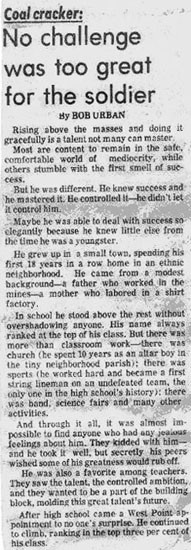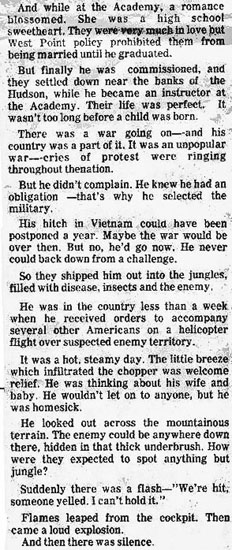| Coal Cracker: No Challenge Was Too Great for the Soldier. By Bob Urban (This newspaper article about Coaldale’s Captain Norman L. Nesterak, U.S. Army, was written by Bob Urban sometime in the late 1960’s shortly after Captain Nesterak lost his life in Vietnam.) Rising above the masses and doing it gracefully is a talent not many can master. Most are content to remain in the safe, comfortable world of mediocrity, while others stumble with the first smell of success. But he was different. He knew success and he mastered it. He controlled it—he didn’t let it control him. Maybe he was able to deal with success so elegantly because he knew little else from the time he was a youngster. He grew up in a small town, spending his first 18 years in a row home in an ethnic neighborhood. He came from a modest background—a father who worked in the mines—a mother who labored in a shirt factory. In school he stood above the rest without overshadowing anyone. His name always ranked at the top of his class. But there was more than classroom work—there was church (he spent 10 years as an altar boy in the tiny neighborhood parish); there was sports (he worked hard and became a first string lineman on an undefeated team); there was band, science fairs and many other activities. And through it all, it was almost impossible to find anyone who had any jealous feelings about him. They kidded with him—and he took it well, but secretly his peers wished some of his greatness would rub off. He was also a favorite among teachers. They saw the talent, the controlled ambition, and they wanted to be a part of the building block, molding this great talent’s future. After high school came a West Point appointment to no one’s surprise. He continued to climb, ranking in the top three per cent of his class. And while at the Academy, a romance blossomed. She was a high school sweetheart. They were very much in love but West Point policy prohibited them from being married until he graduated. But finally he was commissioned, and they settled down near the banks of the Hudson, while he became an instructor at the Academy. Their life was perfect. It wasn’t too long before a child was born. There was a war going on—and his country was a part of it. It was an unpopular war—cries of protest were ringing throughout the nation. But he didn’t complain. He knew he had an obligation—that’s why he selected the military. His hitch in Vietnam could have been postponed a year. Maybe the war would be over then. But no, he’d go now. He never could back down from a challenge. So they shipped him out into the jungles, filled with disease, insects and the enemy. He was in the country less than a week when he received orders to accompany several other Americans on a helicopter flight over suspected enemy territory. It was a hot, steamy day. The little breeze which infiltrated the chopper was welcome relief. He was thinking about his wife and baby. He wouldn’t let on to anyone, but he was homesick. He looked out across the mountainous terrain. The enemy could be anywhere down there, hidden in that thick underbrush. How were they expected to spot anything but jungle? Suddenly there was a flash—“We’re hit, someone yelled, I can’t hold it.” Flames leaped from the cockpit. Then came a loud explosion. And then there was silence.
|

